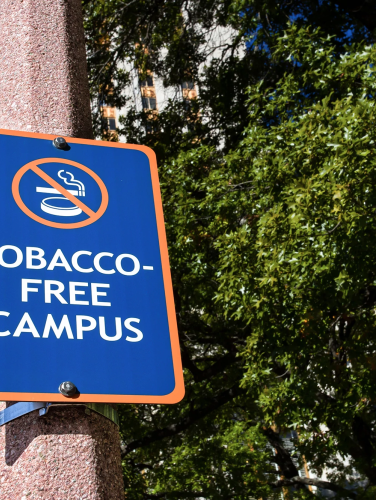City of Charlotte ordinance bans smoking in shopping areas of retail stores >200 people or 25 employees for fire safety.
City of Charlotte smoke-free ordinance for government owned buildings.
Mecklenburg County
Project Assist Funding started (Public Health).
North Carolina
NC enacts law authorizing state/local governments to establish non-smoking areas in government buildings.
Mecklenburg County adopts policy for smoke-free government buildings and vehicles; no smoking except designated areas at Charlotte- Douglas International Airport.
NC Tobacco Prevention & Control Branch sets goal of achieving 100% tobacco-free schools.
Charlotte-Mecklenburg Schools adopt 100% tobacco-free policy for students, staff and visitors – buildings and grounds, school events.
TRU funding from NC HWTF (youth focus) from 2003-2012.
Smoke Free Charlotte which becomes Smoke Free Mecklenburg Coalition starts.
Carolinas HealthCare System (CHS) becomes 100% tobao free.
Duke Endowment funds NC Prevention Partners, in partnership with NC Hospital Association, to help NC hospitals go 100% tobacco free; NC Quitline launches.
City of Charlotte passes resolution to support local control of indoor air laws.
State laws allow UNC institutions to regulate smoking in buildings/on grounds; set 100% tobacco-free policy for public school systems (effective Aug. 1, 2008); and prohibit smoking in long-term care facilities and nursing homes; adopts fire-safe cigarette law.
City of Charlotte adopts tobacco-free policy for government buildings and vehicles.
State laws mandate smoke-free state government buildings and authorize local governments to mandate smoke-free government buildings and vehicles.
CPCC adopts tobacco-free campus policy.
CATS bus system adopts smoke-free policy for center & bus stop shelters.
All 127 full-service NC hospitals are 100% tobacco-free.
Tax rate per pack of 20 cigarettes: 45 cents. Dates of last changes: 5 cents to 35 cents in 2005-06 and from 35 cents to 45 cents in 2009.
UNC Charlotte adopts smoke-free policy for buildings & 100 ft. from doors.
Mecklenburg County Public Health Department adopts tobacco-free grounds policy.
House Bill 2 prohibits smoking in restaurants and bars; law expands local government authority to regulate smoking on government grounds and for certain enclosed public spaces.
City of Charlotte revises tobacco cessation benefits for employees.
Town of Cornelius adopts tobacco-free ordinance for parks; Town of Huntersville adopts smoke-free park policy.
Town of Davidson adds no smoking to Parks Use Policy.
Charlotte Housing Authority: new and renovated buildings to open smoke free.
All state prison facilities go tobacco free.
Tobacco Free Mecklenburg network launches.
Mecklenburg County opens new Romare Bearden Park tobacco free.
Johnson C. Smith University adopts tobacco-free campus policy.
Bank of America Stadium goes smoke free.
Johnson and Wales University adopts tobacco free campus policy.
Medic in Charlotte goes tobacco free.
State operated Mental Health Facilities go 100% tobacco free.
Mecklenburg County Board of Health Rule Smoke-Free Government Grounds (county and 7 municipalities). Mecklenburg County Tobacco- Free Parks Ordinance.
2015–2016: Juul launches youth-focused marketing campaign (national).
Tax rate on E-cigarettes: 5 cents per milliliter of consumable nicotine solution in 2014. (Effective June 1, 2015). G.S> 105-113.35(a).
BB&T Stadium goes tobacco free.
HUD (federal) adopts smoke fre housing policy for housing authorities using “Public Housing” funding (voucher based not covered).
GCAA Smoke-Free Multiunit Housing Certification initiative launches - 69 smoke-free properties by 2022.
Statewide childcare facilities go tobacco free.
Mecklenburg County Public Health's Village HeartBEAT and AHA support 8 Black/AA churches taking campuses tobacco free.
Federal law increased tobacco purchase age to 21; also banned flavored e-cig pods.
2017–2019: Peak of Juul popularity among youth.
Charlotte-Douglas International Airport goes tobacco free for all vendors and business partners (20,000 people); 2 outdoor passenger smoking areas still in place.
Change for Life: Tobacco-Free Recovery Initiative launches to support tobacco free behavioral health.
NC Breathe Easy Initiative supporting tobacco-free behavioral health launches.
McLeod Centers for Well Being (SUD Tx) adopts tobacco-free campus.
Charlotte Rescue Mission adopts tobacco-free campus.
NC’s JUUL Settlement passes June 2021 (1st in country): $40M; increased to $47.8M in 2023.
Anuvia Prevention & Treatment goes tobacco free (previously smoke free in detox only).
Harmony Health mental Health agency goes tobacco free Hope Haven (SUD Tx) goes TF.
Queens University adopts tobacco-free campus.
Hope Community Clinic goes tobacco free.
Daymark (Mental Health) goes tobacco free.
G.S. 90-85.15B: Immunizing pharmacists can dispense, deliver, or administer Nicotine replacement therapy that is approved by the FDA. Standing Order by NC DHHS Chief Medical Officer and State Health Director.
Tax rate on Cigars is 12.8 percent of the wholesale price of the products with a cap of 30 cents. G.S. 105-113.36A (Effective July 1, 2022)
Clearing the Smoke- Mecklenburg TF Coalition with multicultural focus launches.
NC MedAssist goes TF, including statewide over-thecounter events.
Tobacco point-of-sale data collection (2023 & 2025); T-21 & retail permitting advocacy
State law (HB900) creates NC Vapor Registry. (amends Youth Access Law G.S> 14-313 (g)-(i)
Northeastern University adopts tobacco-free campus in Charlotte and 11 campuses nationwide.
Smith Family BH Urgent Care goes tobacco free
Monarch (Mental Health) goes tobacco free.
BOCC signs proclamation supporting NC T-21 and tobacco retail licensure.
Charlotte Pride takes Youth and Family Zone of Pride Festival tobacco free and moves event to tobacco-free First Ward Park.
NC Tobacco Prevention & Control staff furloughed after CDC stop work order and Office of Smoking and Health eliminated; Regional staff funding switched to JUUL settlement.
Tobacco-free campus policy requirement for NC Medicaid and state-funded service providers providing medical, behavioral health, I/DD and TBI services. Original effective date moved multiple times and is now January 2027.


